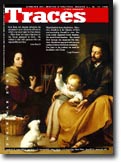
Traces N.10, November 2003
A Date with Nothingness, or with BeingThere is a new fad spreading through the world, from New York to Paris by way of Rome and Milan. It is called a “flash mob.” It could also be called “a date with nothingness.” Somebody launches via Internet a call to meet, at a certain hour and a certain place, with no reason except to clap or send up a shout there. Just a few minutes of gathering are enough; then the casual, unknown crowd disperses. And off again into the anonymity of the Web, until the next time. The participants say they are satisfied with this “weak belonging.” In all probability, behind the word “weak” lies the desire that the experience of belonging–no matter how it was sought–could have more to do with freedom than with constraint or a plan.
Every fad, even the strangest one, is born of a desire, that perhaps becomes perverted or is adapted into a form of entertainment, in a divergence from its own true satisfaction.
Life, all of life, waits for an appointment. No one is interested in an existence with few encounters. But if you miss your date with the meaning of life, even filling up your day with tasks and appointments produces only stupor and boredom.
Christianity, after all, is precisely the date with meaning. The Christian event was the most unexpected and definitive date that God set with man; He no longer had to be sought gropingly, solely in the signs of the fire, the heavens, and prophecies. Now He is there in a human presence, a Man who drinks and eats, is moved, and seeks the friendship of men. God made a date in the closest and most accessible place: the dailiness of a companionship. And thus He scandalized those who wanted to keep God at a distance, in their own imaginations and as the crown of their own intelligence.
“One day, the Stranger came into the house,” wrote a great Italian poet, Piero Bigongiari.
Ever since the Stranger (as Eliot called His body, the Church) came onto the horizon of history, man has been offered the chance to belong to the meaning of the world. It is an experience that enacts–alone among all of them–belonging as an experience of freedom. Not only freedom from every other kind of belonging that claims to tie man down in accordance with some of his aspects (political, tribal, instinctual, or social), but above all freedom as the continuing discovery of the infinite value of the “I.”
In Catholic belonging, the person discovers the freedom and absolute value of his own “I,” albeit within every limitation, knowing in his everyday existence the exaltation of Being, because “the glory of God is man who lives.”